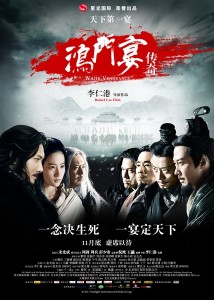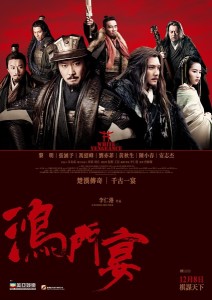White Vengeance
鸿门宴
Hong Kong/China, 2011, colour, 2.35:1, 137 mins.
Director: Li Rengang 李仁港 [Daniel Lee].
Rating: 6/10.
Impressive costume drama about two warring leaders loses the plot halfway.
Shaanxi province, central China, winter, 183 BC. Twelve years after the death of the Han dynasty’s first emperor, Liu Bang (Li Ming), the Grand Tutor (Wu Ma) leads a group of seven young students to the site of a famous meeting in 206 BC – the so-called Feast at Hong Gate – between Liu Bang and Xiang Yu (Feng Shaofeng), then rival leaders following the collapse of the Qin dynasty. A mysterious figure appears, and tells the story of how Liu Bang and Xiang Yu first met during the period following the death of Qin Shi Huang and the interregnum by King Huai II of Chu (Zhao Huinan). Both agreed to overthrow the Qin, but it was Liu Bang who first reached the capital, Xianyang, along with Xiang Yu’s woman, Consort Yu (Liu Yifei),  whom Liu Bang had helped protect. In Xianyang, Liu Bang took on Zhang Liang (Zhang Hanyu), a wily weiqi (Go) player leading a group of six assassins, as his advisor, against the advice of loyalists such as Fan Kuai (Chen Xiaochun). Zhang Liang advised Liu Bang, who had no ambitions at ultimate power and less forces than Xiang Yu, to stay in the city and win its citizens over to his side. Thinking that Liu Bang had betrayed him, and spurred on by his aged uncle and advisor Fan Zeng (Huang Qiusheng), Xiang Yu invited Liu Bang to a meeting at Hong Gate. Liu Bang respectfully handed over the imperial seal and said Consort Yu was safe under his protection for the meantime. To resolve the impasse, Zhang Liang challenged the blind Fan Zeng to a game of multiple weiqi on five boards.
whom Liu Bang had helped protect. In Xianyang, Liu Bang took on Zhang Liang (Zhang Hanyu), a wily weiqi (Go) player leading a group of six assassins, as his advisor, against the advice of loyalists such as Fan Kuai (Chen Xiaochun). Zhang Liang advised Liu Bang, who had no ambitions at ultimate power and less forces than Xiang Yu, to stay in the city and win its citizens over to his side. Thinking that Liu Bang had betrayed him, and spurred on by his aged uncle and advisor Fan Zeng (Huang Qiusheng), Xiang Yu invited Liu Bang to a meeting at Hong Gate. Liu Bang respectfully handed over the imperial seal and said Consort Yu was safe under his protection for the meantime. To resolve the impasse, Zhang Liang challenged the blind Fan Zeng to a game of multiple weiqi on five boards.
REVIEW
Variable Hong Kong director Li Rengang 李仁港 [Daniel Lee] (Three Kingdoms: Resurrection of the Dragon 三国之见龙卸甲, 2008; 14 Blades 锦衣卫, 2010) aims high but starts going seriously wobbly from the mid-point with White Vengeance 鸿门宴, an historical action drama based around rival leaders Liu Bang and Xiang Yu during the so-called Chu-Han Contention period (206-202 BC) that followed the collapse of China’s first dynasty, the Qin. The era is favourite fodder for Chinese-language TV dramas and received fine treatment in the 178-minute version of The Great Conqueror’s Concubine 西楚霸王(1994), with Zhang Fengyi 张丰毅, Lv Liangwei 吕良伟 and Gong Li 巩俐, directed by Xian Qiran 冼杞然 [Stephen Shin]. Li’s version attempts to be two films in one, initially centring on the famous Feast at Hong Gate of 206 BC, in which Xiang Yu invited Liu Bang to a banquet at which the latter was almost murdered, and then carrying on for another four years up to the former’s eventual defeat and his suicide after the Battle of Gaixia. The result is a dramatic first hour leading up to and including the Hong Gate event, followed by a second hour that lets all the air out of the bag.
The Feast at Hong Gate 鸿门宴 – which has since entered the Chinese language to mean “a treacherous invitation” – is also the subject of the forthcoming The Last Supper 王的盛宴 (2012) with Liu Ye 刘烨 and Wu Yanzu 吴彦祖 [Daniel Wu], directed by Lu Chuan 陆川. From its Chinese title, “The Feast at Hong Gate”, Li’s movie looks like a rival production that got first out of the traps; in fact, once his script gets to the eponymous banquet after almost an hour of atmospheric lead-up, Li jettisons the well-documented dinner and replaces it with an elaborate game of weiqi (Go) between the two sides that then leads to an outbreak of martial arts. That done, the film has a where-do-we-go-from-here feel, literally losing the plot as it wanders all over the map during the final hour in a story of warfare, betrayal, tragic romance and a lesson on the loneliness of ultimate power.
This wouldn’t matter so much if the twin personalities of Liu Bang and Xiang Yu were (a) well played and (b) dominated the movie. Unfortunately, Li Ming 黎明 [Leon Lai] is wooden as Liu Bang (and hardly the bluff peasant general of history), while Feng Shaofeng 冯绍峰 is not much more than a handsome matinee idol as the reputedly clever Xiang Yu. There’s no chemistry between the two to build a film on their edgy relationship, and they’re outclassed by a strong cast in what should be subsidiary roles. As Liu Bang’s wily advisor, China’s Zhang Hanyu 张涵予 (Assembly 集结号, 2007; The Message 风声, 2009) acts everyone else off the screen with his usual understated intensity, including a monk-like Huang Qiusheng 黄秋生 [Anthony Wong] as Xiang Yu’s equally wily, blind advisor. There’s more chemistry between these two actors than between Li and Feng, though still not enough to make their later scenes together resonate emotionally.
Other roles, though often well-played individually, also don’t cohere into a single drama. As Xiang Yu’s consort, Mainland actress Liu Yifei 刘亦菲 largely sits in carriages, plays her pipa, or waits on the sidelines looking beautiful, making the love story a non-starter. Among several characterful supports, Hong Kong’s Chen Xiaochun 陈小春 [Jordan Chan] has the strongest moments but, again, not enough follow-through in the script to justify his final emotional scene.
On a technical level the movie is classy, with dark cavernous sets designed by director Li himself; ominous, uncolourful costuming by Hong Kong’s Huang Mingxia 黄明霞 and Mo Junjie 莫均杰 [Eddie Mok]; atmospheric photography by Zhang Dongliang 张东亮 [Tony Cheung]; and good battles and action that manage to be visceral without much blood-letting. The score by Li Yunwen 李允文 [Henry Lai] is, however, weak.
[In China the tag 传奇 (“legend”) was added to the title.]
CREDITS
Presented by Starlight International Media Group (CN). Produced by Visualizer Film Production (HK).
Script: Li Rengang [Daniel Lee]. Photography: Zhang Dongliang [Tony Cheung]. Editing: Deng Wen-tao. Music: Li Yunwen [Henry Lai]. Theme song: Lei Songde [Mark Lui]. Lyrics: Yao Qian. Production design: Li Rengang [Daniel Lee]. Art direction: Fang Yiheng. Costume design: Huang Mingxia. Stylist: Mo Junjie [Eddie Mok]. Action: Liang Xiaoxiong [Tony Leung]. Executive director: Chen Zhiliang.
Cast: Li Ming [Leon Lai] (Liu Bang), Zhang Hanyu (Zhang Liang, his advisor), Liu Yifei (Consort Yu), Feng Shaofeng (Xiang Yu), Huang Qiusheng [Anthony Wong] (Fan Zeng, his advisor), Chen Xiaochun [Jordan Chan] (Fan Kuai), An Zhijie [Andy On] (Han Xin), Xiu Qing (Xiao He), Ding Haifeng (Xiang Zhuang), Xu Xiangdong (Xiang Bo), Chen Guantai (Qiu Ran), Wu Ma (Grand Tutor), Chen Zhihui (Xiahou Ying), Du Yuming (Long Ju), Sun Wenting, Meng Tongdi, Huang Ziqi (Three Sisters of Nangong), Du Yiheng (male demon), Jia Qing (female demon), Zhao Huinan (King Huai II of Chu), Zhao Wenhao (Bofu, student).
Release: China, 29 Nov 2011; Hong Kong, 8 Dec 2011.
(Review originally published on Film Business Asia, 30 Dec 2011.)
